“The tea which had been ordered was brought up at the end of ten minutes; but the maid, as she approached the door, was surprised to hear the voices of her master and mistress in furious altercation. She knocked without receiving any answer, and even turned the handle, but only to find that the door was locked upon the inside. Naturally enough she ran down to tell the cook, and the two women with the coachman came up into the hall and listened to the dispute which was still raging. They all agreed that only two voices were to be heard, those of Barclay and of his wife. Barclay’s remarks were subdued and abrupt so that none of them were audible to the listeners. The lady’s, on the other hand, were most bitter, and when she raised her voice could be plainly heard. ‘You coward!’ she repeated over and over again. ‘What can be done now? What can be done now? Give me back my life. I will never so much as breathe the same air with you again! You coward! You coward!’ Those were scraps of her conversation, ending in a sudden dreadful cry in the man’s voice, with a crash, and a piercing scream from the woman. Convinced that some tragedy had occurred, the coachman rushed to the door and strove to force it, while scream after scream issued from within. He was unable, however, to make his way in, and the maids were too distracted with fear to be of any assistance to him. A sudden thought struck him, however, and he ran through the hall door and round to the lawn upon which the long French windows open. One side of the window was open, which I understand was quite usual in the summertime, and he passed without difficulty into the room. His mistress had ceased to scream and was stretched insensible upon a couch, while with his feet tilted over the side of an armchair, and his head upon the ground near the corner of the fender, was lying the unfortunate soldier stone dead in a pool of his own blood.

“Naturally, the coachman’s first thought, on finding that he could do nothing for his master, was to open the door. But here an unexpected and singular difficulty presented itself. The key was not in the inner side of the door, nor could he find it anywhere in the room. He went out again, therefore, through the window, and, having obtained the help of a policeman and of a medical man, he returned. The lady, against whom naturally the strongest suspicion rested, was removed to her room, still in a state of insensibility. The colonel’s body was then placed upon the sofa and a careful examination made of the scene of the tragedy.
“The injury from which the unfortunate veteran was suffering was found to be a jagged cut some two inches long at the back part of his head, which had evidently been caused by a violent blow from a blunt weapon. Nor was it difficult to guess what that weapon may have been. Upon the floor, close to the body, was lying a singular club of hard carved wood with a bone handle. The colonel possessed a varied collection of weapons brought from the different countries in which he had fought, and it is conjectured by the police that this club was among his trophies. The servants deny having seen it before, but among the numerous curiosities in the house it is possible that it may have been overlooked. Nothing else of importance was discovered in the room by the police, save the inexplicable fact that neither upon Mrs. Barclay’s person nor upon that of the victim nor in any part of the room was the missing key to be found. The door had eventually to be opened by a locksmith from Aldershot.